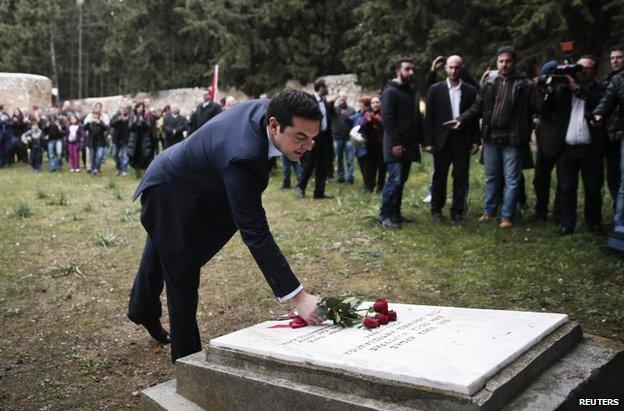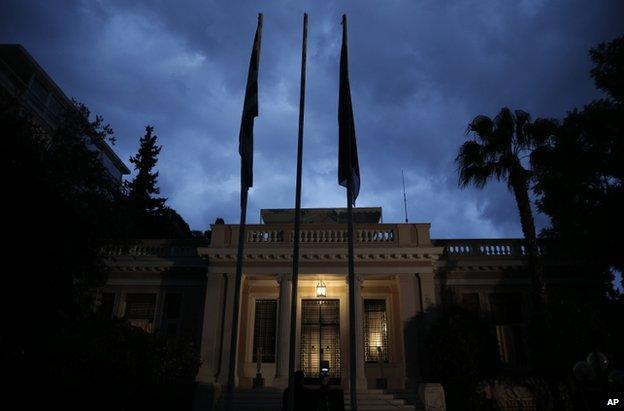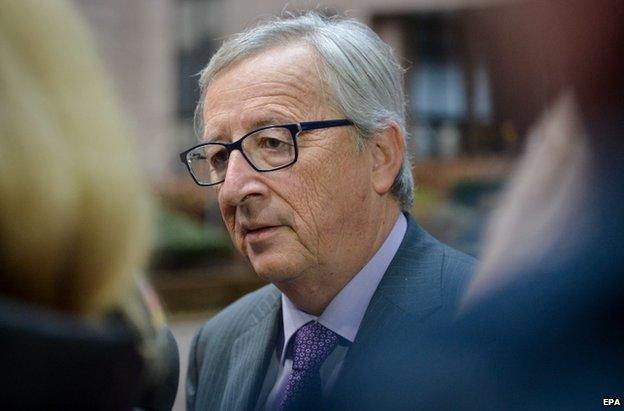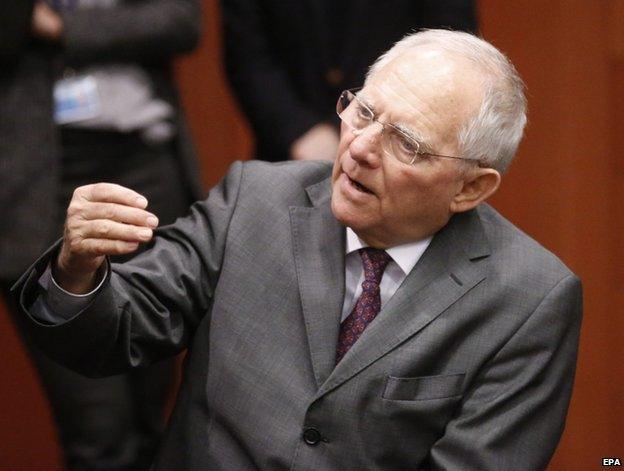Greece anti-bailout leader Tsipras made prime minister
- Published
Alexis Tsipras sworn in as Greek prime minister
The head of Greece's far-left Syriza party, Alexis Tsipras, has been sworn in as prime minister and is set to lead an anti-austerity coalition government.
Turning up for the ceremony without a tie, the leftist took the oath less than 24 hours after winning the general election on an anti-austerity platform.
Earlier, he formed a coalition with the centre-right Independent Greeks.
European Commission head Jean-Claude Juncker has reminded him of the need to "ensure fiscal responsibility".
Congratulating Mr Tsipras on his election win, Mr Juncker said in a tweet, external: "The European Commission stands ready to continue assisting Greece in achieving these goals." He also referred to "promoting sustainable jobs and growth".
The BBC's full coverage of the reaction can be found here.
The Syriza leader has vowed to renegotiate the bailouts, which are worth €240bn (£179bn; $268bn).
Jeroen Dijsselbloem, head of the eurozone finance ministers' group (the Eurogroup), said after a meeting of the group in Brussels that it congratulated the new Greek government on its electoral success and looked forward to working with it.
He said it was too early to comment on the Syriza-led government's policies as they were still being formulated.
The euro recovered from an 11-year low against the US dollar as investors digested what Syriza's victory meant for the eurozone's future. Europe's main share markets also rose - after initial falls - on hopes that a compromise over Greece's bailout terms might be found.
It is likely that investors believe reason will prevail, and Berlin will sanction a write-off of Greece's excessive debts, BBC economics editor Robert Peston reports.

Analysis: Mark Lowen, BBC News, Athens
What unites Greece's new coalition partners is fierce opposition to budget cuts. Alexis Tsipras and Independent Greeks leader Panos Kammenos are anti-bailout to the core, frequently hitting out at the architects of austerity in Berlin and Brussels and pledging a new economic path. But that is where their common ground ends. In other areas, the two are unlikely bedfellows.
One is a socially liberal leftist, lambasting the "old faces" of Greek politics. The other is a hardline right-winger on issues such as immigration - and has been around in previous governments for some time. So why would Syriza join forces with Independent Greeks?
Possibly because others refused - or were deemed too soft on the bailout. The River, a new, broadly centrist party which some expected to be the coalition partner, made clear it opposed Syriza's hard rhetoric towards Berlin.
The problem for Mr Tsipras is that many of his own supporters revile Mr Kammenos's conservatism and will be frustrated by the choice. And disappointing his supporters, to whom he has pledged so much, is not something Greece's new prime minister wants to repeat.


Alexis Tsipras smiles after being sworn in as prime minister

Alexis Tsipras lays flowers at a war memorial in Athens

Heavy rain and a spectacular lightning storm added to the sense of momentous change in Athens on Monday

Maximos Mansion, the Greek prime minister's official residence in central Athens, has a new tenant
With all of the votes counted, external in Sunday's poll, Syriza has 149 seats, just two short of an absolute majority. The Greek Independents have 13 seats in the 300-seat parliament.
Breaking with tradition at his swearing-in, Mr Tsipras also refused the customary blessing from Orthodox priests.
In his first act as prime minister, he laid flowers at a memorial to Greek Resistance fighters killed by Nazi Germany during World War 2.
It is expected that a new cabinet will be formed on Tuesday.
Savouring victory: the leader of an anti-austerity revolution
The man tipped to become the new Greek finance minister, Yanis Varoufakis, told the BBC the austerity regime had been "fiscal waterboarding policies that have turned Greece into a debt colony".
The economy has shrunk drastically since the 2008 global financial crisis, and increasing unemployment has thrown many Greeks into poverty.
On Sunday, Mr Tsipras told jubilant supporters he wanted to write off half of Greece's debt, but was ready to negotiate "a viable solution" and wanted the country to stay in the eurozone.

The troika of lenders that bailed out Greece - the EU, the European Central Bank and the International Monetary Fund - imposed big budgetary cuts and demanded reform in return for the bailout money.
The EU's Commissioner for Economic and Financial Affairs, Pierre Moscovici, said the Eurogroup was ready to work with the new Greek government.
"We want a Greece that is able to stand on its own feet again," he said in Brussels. "We want a Greece which can create prosperity for all its people... but we also want a Greece which can repay its debts."
Martin Schulz, the speaker of the European Parliament and a leading German Social Democrat, urged the new Greek prime minister to stick to existing agreements to "stabilise the country and to stabilise the European Union".

Jean-Claude Juncker attends the finance minister meeting in Brussels

German Finance Minister Wolfgang Schaeuble at the finance ministers' meeting in Brussels
Finnish Prime Minister Alexander Stubb warned his country had no intention of writing off Greece's debts but suggested the loan repayment period could be extended.
Finland, which faces a general election in April, has a reputation for taking a hawkish line on the bailouts.
The BBC's Clive Myrie: "This is a leap into the unknown"

New Greek coalition - allies and dates to watch
Syriza, acronym meaning the "Radical Coalition of the Left", was formed in 2004 and is led by Alexis Tsipras, 40; first came to prominence after 2008 Greek riots
The Greek Independents, a right-wing party formed as a New Democracy splinter in 2012 and led by Panos Kammenos; hard line on immigration
Both allies want to end austerity and renegotiate Greece's debt
27 Jan: Government cabinet expected to be named
28 Feb: Bailout extension expires
20 Jul: 3.5bn euro bonds mature

Are you in Greece? What difference will the election result make? You can share your experiences by emailing haveyoursay@bbc.co.uk, external. If you would be happy to speak further to a BBC journalist, please include a contact telephone number.